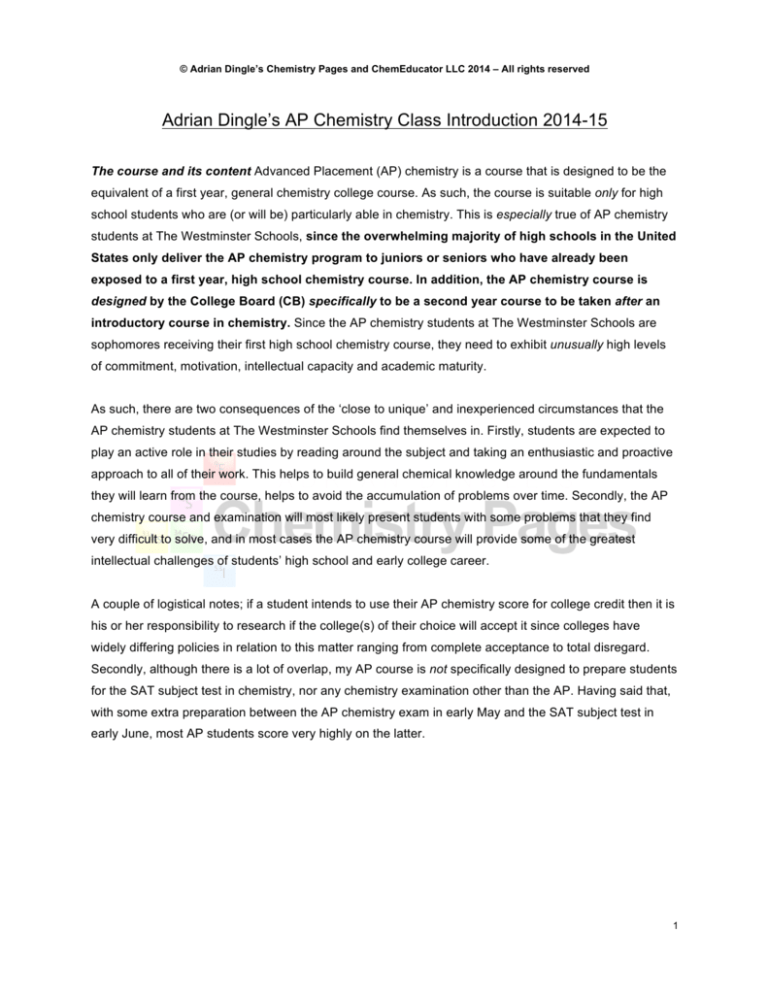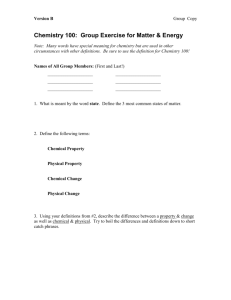
© Adrian Dingle’s Chemistry Pages and ChemEducator LLC 2014 – All rights reserved
Adrian Dingle’s AP Chemistry Class Introduction 2014-15
The course and its content Advanced Placement (AP) chemistry is a course that is designed to be the
equivalent of a first year, general chemistry college course. As such, the course is suitable only for high
school students who are (or will be) particularly able in chemistry. This is especially true of AP chemistry
students at The Westminster Schools, since the overwhelming majority of high schools in the United
States only deliver the AP chemistry program to juniors or seniors who have already been
exposed to a first year, high school chemistry course. In addition, the AP chemistry course is
designed by the College Board (CB) specifically to be a second year course to be taken after an
introductory course in chemistry. Since the AP chemistry students at The Westminster Schools are
sophomores receiving their first high school chemistry course, they need to exhibit unusually high levels
of commitment, motivation, intellectual capacity and academic maturity.
As such, there are two consequences of the ‘close to unique’ and inexperienced circumstances that the
AP chemistry students at The Westminster Schools find themselves in. Firstly, students are expected to
play an active role in their studies by reading around the subject and taking an enthusiastic and proactive
approach to all of their work. This helps to build general chemical knowledge around the fundamentals
they will learn from the course, helps to avoid the accumulation of problems over time. Secondly, the AP
chemistry course and examination will most likely present students with some problems that they find
very difficult to solve, and in most cases the AP chemistry course will provide some of the greatest
intellectual challenges of students’ high school and early college career.
A couple of logistical notes; if a student intends to use their AP chemistry score for college credit then it is
his or her responsibility to research if the college(s) of their choice will accept it since colleges have
widely differing policies in relation to this matter ranging from complete acceptance to total disregard.
Secondly, although there is a lot of overlap, my AP course is not specifically designed to prepare students
for the SAT subject test in chemistry, nor any chemistry examination other than the AP. Having said that,
with some extra preparation between the AP chemistry exam in early May and the SAT subject test in
early June, most AP students score very highly on the latter.
1
© Adrian Dingle’s Chemistry Pages and ChemEducator LLC 2014 – All rights reserved
Textbook and other resources I do not insist that students buy a textbook since I don’t ask them to
specifically refer to one. However, should students feel the need to have one to refer to, the College
Board has produced a list of suitable texts. I will ask students to purchase my AP Crash Course book at
the beginning of the second semester.
The AP chemistry exam is sponsored by the CB and administered and operated by the Educational
Testing Service (ETS). The specific Big Ideas, Enduring Understandings, Essential Knowledge, Learning
Objectives and Science Practices relating to the AP chemistry course, can all be found in the AP
chemistry course description published by the College Board.
You will also find a lot of information about the AP chemistry course and exam in the AP chemistry
section of the College Board website.
The course notes The notes amplify the content of the whole course. They are vitally important to
students as they form a permanent, hard copy record that summarizes all of the knowledge and
understanding that students require in order to perform well in the AP chemistry examination. Each set of
notes should be used and annotated however the student sees fit. They must be used as the basis for
study.
My website All the materials for the course can be downloaded from my website. It is the student’s
responsibility to visit the site to get materials as and when they are needed. In addition to the course
material you will find a very large amount of other helpful information there. You are required to visit
regularly; almost certainly, that will mean daily!
www.adriandingleschemistrypages.com
2
© Adrian Dingle’s Chemistry Pages and ChemEducator LLC 2014 – All rights reserved
The expectations In order for us all to have a successful year we have to work together. There are two
sides to this partnership;
(i)
Student obligations. I hope it goes without saying that attendance, punctuality, courtesy and
good behavior of the highest levels are expected at all times. On the occasions when it is
unavoidable that a class is missed, it remains the responsibility of the student to catch up with
any material missed. Laboratory safety is always of paramount importance. Exemplary
behavior and observance of safety procedures is required at all times. The very nature of the
AP chemistry program, attempting as it does to mimic a college chemistry course, requires
students to learn and apply college style learning skills. More specifically taking the initiative
for one’s own learning and being prepared to think around problems to find solutions. Please
seek help and use office hours if you are having difficulties.
(ii)
My commitment. I will always grade and return work to you as soon as possible and will be
happy to review any problems that arise from it. I am always happy to speak to students and
parents outside of class time, as and when time permits.
The assessment The course will be assessed in four areas.
(i)
Testing. Students will be tested on a regular basis. The tests will make up 60% of the final
FIRST semester grade and 60% of the final SECOND semester grade. All tests have two
sections; a multiple–choice section and a free-response section.
(ii)
Homework. Homework will be set on a regular basis and deadlines must be met. The
homework will make up 20% of the final FIRST semester grade and 40% of the final
SECOND semester grade.
(iii)
Quizzes. Each quiz, although taken under test conditions, only counts as the equivalent of a
homework grade.
(iv)
Examination. All material studied up to the middle of December of the FIRST semester will
be assessed in a written examination in December 2014. The exam will make up 20% of the
final FIRST semester grade. There is no internal, SECOND semester examination. This is
replaced by the ULTIMATE assessment, i.e., the AP chemistry examination itself, in May of
2015.
3
© Adrian Dingle’s Chemistry Pages and ChemEducator LLC 2014 – All rights reserved
The AP chemistry examination format The AP chemistry exam is divided into two sections. Much more
on this later, but for now;
Section I: (90 minutes, 50% of the total grade)
60, multiple-choice questions. Select the best answer from a choice of four (A-D).
In this section of the exam NO CALCULATOR is allowed but access to the periodic table and equations &
constants sheet is allowed (found on pages 160-162 of the course description). 1 point is awarded for a
correct answer, 0 points (without penalty as of 2011) for a wrong answer, and 0 points for any question
left unanswered.
Section II: (90 minutes, 50% of the total grade)
7, free-response questions. (3 ‘long’ questions & 4 ‘short’ questions).
In this section of the exam a calculator is allowed along with access to the periodic table and equations &
constants sheet.
Adrian Dingle
August 2014
4







